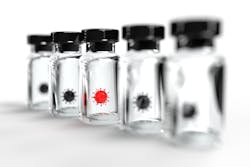LJI scientists publish first comparison of four COVID-19 vaccines
Scientists at La Jolla Institute for Immunology (LJI) have published the first analysis of how four types of COVID-19 vaccines prepare the body to fight SARS-CoV-2, according to a news release.
Their in-depth look at how T cells, B cells, antibody levels shift in the six months following vaccination is critical for understanding of how to protect people in the ongoing pandemic.
The investigation, published in Cell, is the first study in history to compare how three different vaccine platforms trigger an immune response against the same pathogen.
“This study is important because it lets us answer how different vaccine platforms perform in terms of inducing immune responses,” says LJI Professor Alessandro Sette, Doctor of Biol. Science.
The researchers studied human immune responses to an mRNA platform (Pfizer-BioNTech and Moderna vaccines), a recombinant protein-based adjuvanted vaccine platform (Novavax), and a viral vector-based platform (Janssen/J&J). All four vaccines in this study were designed to prepare the immune system to fight the same target, called the SARS-CoV-2 Spike protein.
“We aren’t giving a vaccine scorecard,” says LJI Research Assistant Professor Daniela Weiskopf, PhD, who co-led the study with Sette and LJI Professor Shane Crotty, PhD. “This kind of side-by-side analysis has never been done before with people who received different vaccines at the same time—in a real-life setting. Just understanding the immune responses to these vaccines will help us integrate what is successful into vaccine designs going forward.”
“This is a very valuable, comprehensive immunological evaluation of these four different vaccines,” says Crotty.
The new study confirms that most people retain some immune response to SARS-CoV-2, regardless of which vaccine they receive. The researchers caution that this immune memory may not prevent infection, but it appears to help fight severe disease.
“Even if it is difficult to maintain a high level of neutralizing antibodies long term, the presence of a stable cellular immunity shows that the immune system can be reactivated very quickly, in a matter of days, if there is an infection,” says Sette.

